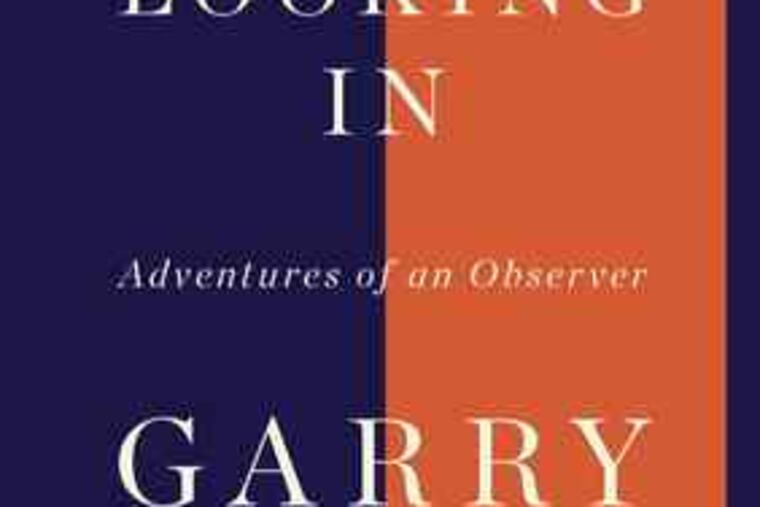'Outside Looking In': Fascinating glimpses into the lives of the powerful
One fall evening in 1971, my wife and I were slowly driving through the Johns Hopkins University campus in Baltimore, where we lived, looking for a parking space near a lecture hall, when we spotted a rumpled-looking man in a tan summer suit wandering along the sidewalk. He was leafing through some papers and, almost miraculously, it seemed, avoiding a tumble into the street.

Adventures of an Observer
By Garry Wills
Viking. 184 pp. $25.95
nolead ends nolead begins
Reviewed by Paul Jablow
One fall evening in 1971, my wife and I were slowly driving through the Johns Hopkins University campus in Baltimore, where we lived, looking for a parking space near a lecture hall, when we spotted a rumpled-looking man in a tan summer suit wandering along the sidewalk. He was leafing through some papers and, almost miraculously, it seemed, avoiding a tumble into the street.
"I think that's him," she said. "It's Garry Wills." As, indeed, it turned out to be. He was preparing to speak on his latest book, Nixon Agonistes: The Crisis of the Self-Made Man.
It was the only time I have seen Wills in person, but I still remember a low-key, self-effacing style of the sort that gets subjects to open up their heart, mind, and perhaps a vein or two.
The Nixon biography was only the seventh in what has turned out to be an astonishing string of about 40 works, ranging through religion, politics, and history, with occasional stopovers in his own life and education.
This latest effort, meandering between memoir and essay collection, is about as unstructured as Wills' walk seemed to be that fall afternoon on the Hopkins campus. One almost gets the impression that the publisher wanted Wills to do a real memoir and that he was too modest for that.
But in this case, function overrides form. The glimpses into people he interviewed, knew, befriended, or wrote about are simply fascinating.
Wills, who holds a doctorate in classics, reads Greek in jail after being arrested in a 1972 antiwar demonstration, reports on the killings of the Rev. Dr. Martin Luther King Jr. and Jack Ruby, serves on a jury at the Baltimore Film Festival, covers the 1968 Nixon campaign and the subsequent campaigns of Jimmy Carter and Michael Dukakis, and spends weeks in Little Rock, Ark., interviewing Bill and Hillary Clinton.
He writes about Studs Terkel; about his father, Jack; about his wife, Natalie, to whom he has been married for more than 50 years; and, at the greatest length, about his complex friendship with the formidably complex William F. Buckley Jr., which bent but did not break under the strain of Wills' slow turn from National Review conservative to confirmed liberal.
At one point, Wills writes of demonstrating in the Capitol with another conservative-turned-liberal, Karl Hess, who had been a speechwriter for conservative Sen. Barry Goldwater (R., Ariz.). Wills recalls Goldwater pulling Hess to his feet and asking why he didn't come to see him anymore. Hess, sporting a beard and camouflage outfit, told Goldwater he thought his staff would not welcome him.
Too bad for them, Goldwater replied. "You're my friend."
It is just one of the unexpected nuggets that pop up throughout this slim volume that one wishes was thicker.
Wills says that while Buckley accepted his liberalism, the great radical journalist I.F. Stone never could accept his conviction that Alger Hiss was guilty of treason, and only once broke his silence, in a bizarre 3 a.m. phone call asking Wills' help in translating a passage in Greek.
Although the book has its share of fine political reportage, Wills, the ultimate outsider, never felt comfortable actually joining a campaign press corps.
Explaining why, he recounts an invitation from James Fallows, then a speechwriter for Carter, to join the 1976 campaign for awhile: "I answered that one can be an entomologist without becoming a bug."
This concern for distance hardly kept him from such observations as this, of Richard M. Nixon's nose:
"In pictures, the most striking aspect is the ski-jump silhouette ["Bob Hope and I would make a great ad for Sun Valley"] but the aspect that awes one when he meets Nixon is its distressing width, accentuated by the ravine running down its center, and by its general fuzziness . . . the nose swings far out; then, underneath, it does not rejoin his face in a straight line but curves back up again, leaving a large but partially screened space between nose and lip."
This description, however, was part of an Esquire article "in which I argued that he was not a right-wing extremist but an intellectually serious and prepared candidate, though one insecure and defensive."
Similarly, Wills portrays Buckley - an usher at his wedding - not simply as the liberal caricature who once openly championed white supremacy. Wills' Buckley "was just an exciting person to be around," a man whose racial views softened, wonderfully gracious, a lover of debate who hired liberals such as Murray Kempton to write occasionally for National Review.
But Buckley was also a bit of a dilettante, described by one of his Yale University professors as prone to eloquently discuss books he had not read. "His garage-office in Stamford," Wills writes, "was piled high with mounds of books, mostly sent to him, hundreds of them in no order. That is not how a person who loves books keeps them."
Wills also tells here for the first time that Buckley beat a polygraph when he joined the CIA, lying to protect a relative from an embarrassing disclosure.
"I guess," Buckley told Wills, "that if you think you have the right to tell a lie, it will not register as one." Wills knows the secret itself, but this he does not tell.